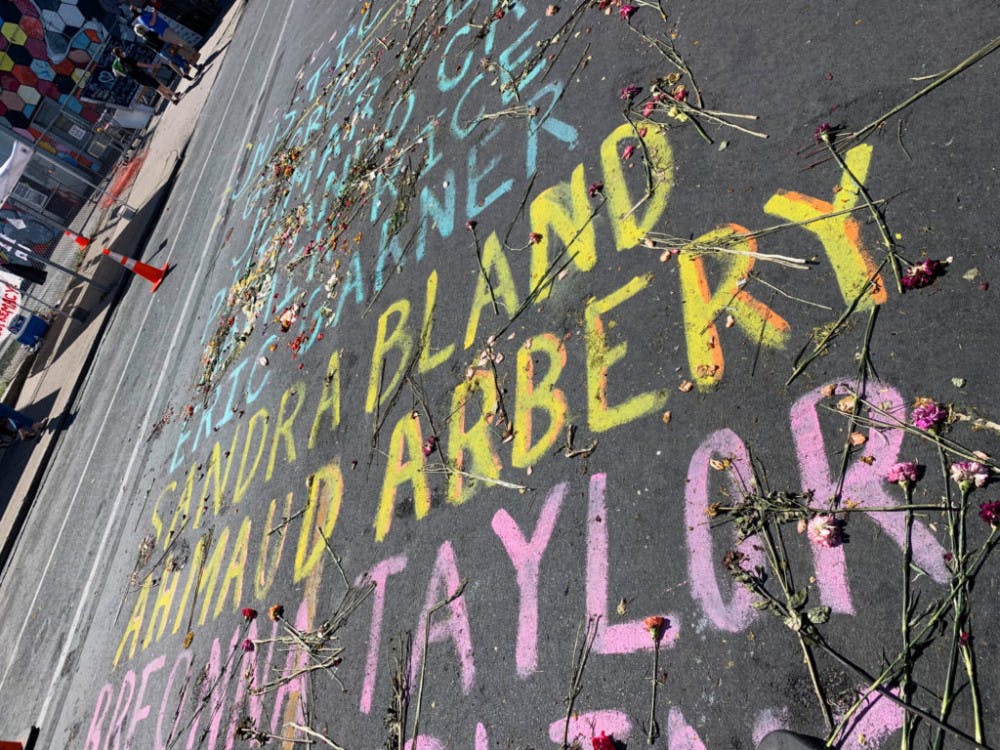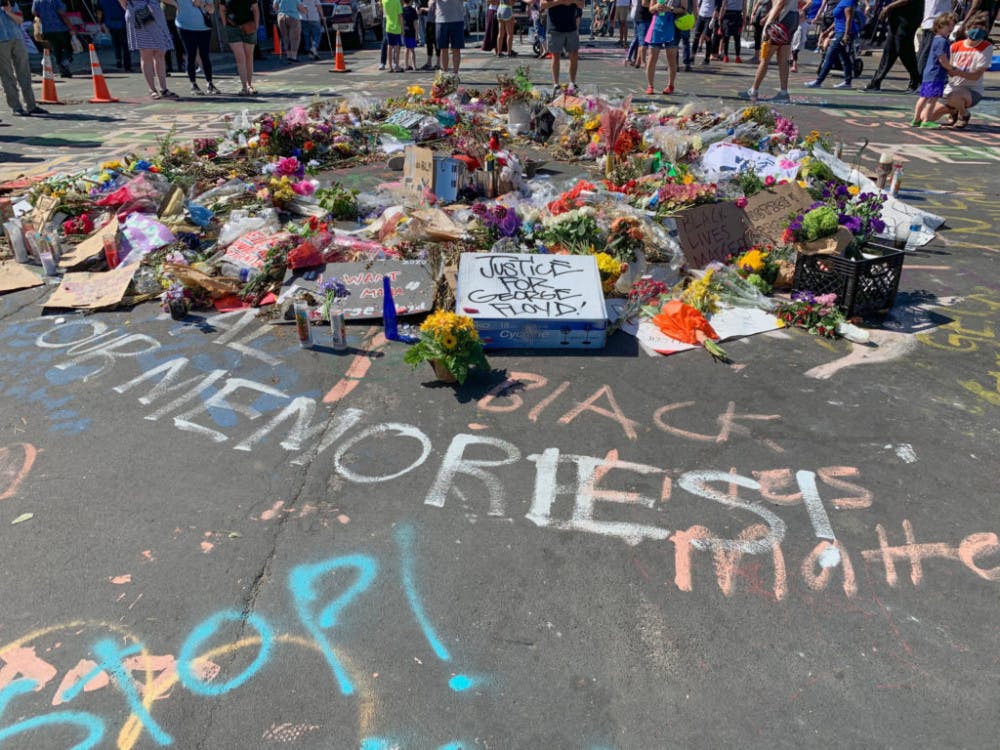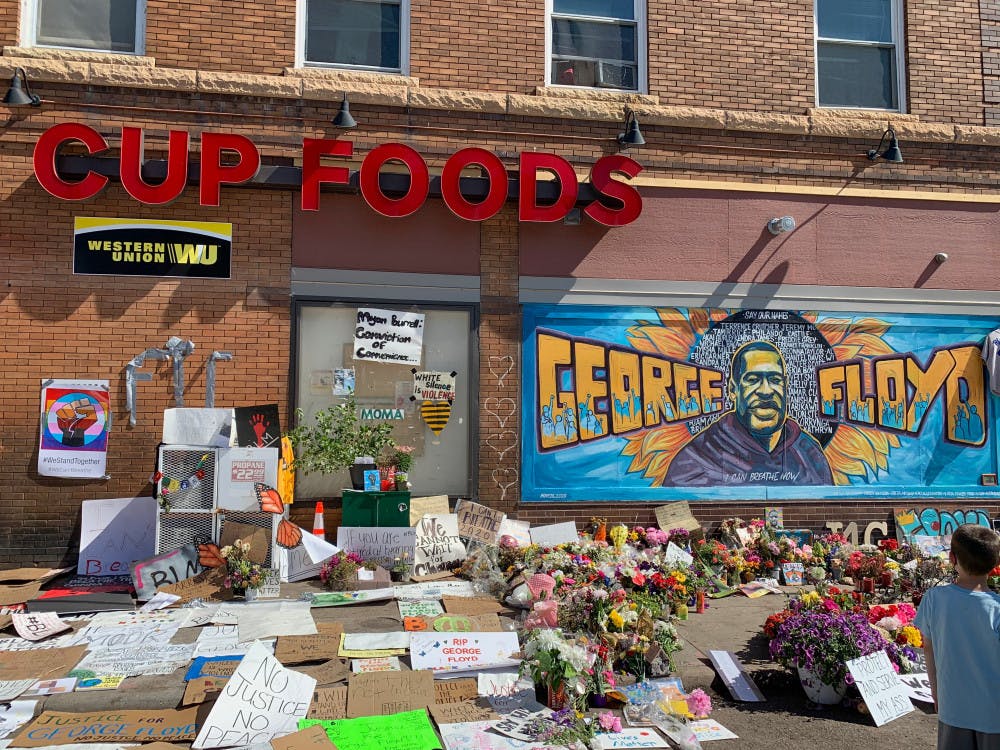As protests against anti-Black police brutality have swelled across the country after George Floyd was killed by a white police officer on May 25, many University students from St. Paul, Minnesota to Atlanta, Georgia are among the tens of thousands taking action.
The demonstrations, beyond calling for justice in Floyd’s death, also follow a string of recent killings of unarmed Black victims, including Ahmaud Arbery on Feb. 23 and Breonna Taylor on March 13.
Over the past eight days, protests have been held in every major U.S. city and dozens of smaller communities, including Providence. Protesters have expressed devastation, grief and outrage over the disproportionate and repeated murders of Black individuals by police, and have condemned this fatal manifestation of the continued systemic racism endemic to the United States.
The Herald reached out to several students who expressed support for the protests on social media, and interviewed six. These students described how and why they have participated in the movement.
Why students have taken action, and how
For Trinity Foley '22, who is Black, the death of Ahmaud Arbery was "really just kind of the one in these recent events that shook me the most." While jogging in a Georgia neighborhood, Arbery was pursued and shot by white residents.
Foley, who attended Black Lives Matter protests in 2016 in her hometown of Atlanta, Georgia following the three back-to-back police shootings that took place that summer, saw the Arbery case as "kind of it for me. I've never been so distraught."
As "someone who was really big on pushing people to call the police stations," Foley called multiple numbers, including the office of Georgia’s Governor Brian Kemp, asking for the arrest of William Bryan. Bryan recorded the video of Arbery's death that was widely circulated on social media after being leaked May 5. He was arrested May 21.
"Being a citizen of Georgia, I don't feel safe knowing that he is able to walk these streets free," she told the clerk who answered her calls, adding, she found it "just blatantly (unjust) to the point where I don't know how (you can) go to sleep at night knowing that you did not arrest this man." She said she received "a very blanket response."
[caption id="" align="aligncenter" width="650"]

In a May 31 interview, Foley told The Herald she was planning on attending a protest in Atlanta later in the day, but expressed despondency about how much change last week's wave of protests will bring.
"I'm feeling just kind of hopeless."
Although "we will keep raising hell until something is done, I really just don't know what it's going to take," Foley said. "I'm feeling just kind of hopeless. I feel like all the riots and protests are going to fall on deaf ears, especially with the person we have in the presidential office right now."
"This country is leaving me pretty lost for words," she added.
The moment has had a profound impact on the people around her, Foley said. She has seen her father, who has lived through various protest movements in America, “excited that things are finally getting to a point that's like, ‘Okay, we're going to force you to hear us.’”
Foley's mother, who is an Atlanta native, "feels the same way as far as it's time for progress," but also has a "double layer" because of her connection to the city — a connection that made her "sad to see parts of the city really getting destroyed," Foley added.
The “desire for people and companies and institutions in power to open their ears and recognize that this is a problem" is one aspect of the situation driving Foley to protest.
Foley hopes this moment can help "turn all of these racial issues from little flare-ups of people protesting, and then government officials saying whatever is necessary to quiet them, into long-standing conversations." This requires "having everybody feel that same sense of urgency for solving this as Black Americans feel because we're faced with it every day."
For Undergraduate Council of Students Chair of Equity and Inclusion Jai'el Toussaint '22, who is Black, what he hopes this moment can help achieve is "hard to wrap it all up in one word, but ... peace. Liberation, freedom, autonomy."
"To live," added Kathleen Riche P '22, Toussaint's mother, who was in the room at the time of the interview and also shared her reflections with The Herald. "To not have to weigh in ‘am I going to die’ if I get pulled over for a traffic ticket."
"When it comes to us, it's like they have to kill us for the littlest things ever," she added. "But when it comes to them,” she said, referring to white people, “they could shoot up a school and then they'd still get the better treatment. I think that doesn't make sense. And we're tired."
"This is a state of living for me."
Toussaint, who regularly comes into close contact with immunocompromised relatives, has not attended any protests due to the ongoing COVID-19 pandemic. He’s been "juggling concerns" about wanting to join the protests and keeping his relatives safe from COVID-19. "There are multiple battles that you're facing," he said.
"This is a state of living for me. This is a reality for me and so many millions of people around the world, across the nation," he said. It's "a fight for your life that you have to engage with every day.”
Toussaint has been supporting protesters by donating and sharing resources on social media, including donation links, protesting tips and generally raising awareness. "I'm not trying to say I have all the answers but just (share) things that I see across my feed that would be beneficial for people to know," he said. "I'm waiting for payday to donate in greater amount(s)."
Adrianna Maxwell '22, who is Black, has not attended protests taking place near her home outside Chicago, Illinois. She has also been donating to show support.
"Even though I'm interested, I don't really know much about protesting … or how to protect yourself,” she said. “So, I would have felt like if I did protest I would have gone into the situation unprepared."
Maxwell chose to donate to grassroots organizations working actively in the streets because she "felt that their voices should be amplified." In addition, she donated to a looted, minority-owned restaurant and to bail funds to help arrested protestors. Though she made a small donation, she hopes to donate more in the future, she added.
Making these efforts was important to her because police brutality against Black people is a "problem (that) has been going on for a really long time," she said. Grassroots organizations, like the ones she has donated to, "have the knowledge and the tools to work actively to try to address these issues."
Toussaint added that he appreciates the vast numbers of people going out and protesting. While it's "tragic that we're in a situation where we have to do that,” he said, “it is inspiring to see so many people across racial lines, class lines, pursuing that fight."
Michael Pérez '22, who is Latino, went alone to a May 29 protest in San Antonio, Texas. “It felt good knowing that my city showed up, and that the communities there and the people feel the same way and feel that same pain,” he said.
Pérez sees his own role and the role of non-Black people in these protests as showing support and solidarity, not just empathizing with the Black community, but understanding "our own place within how we feed and benefit from the system."
Three years ago, when he was 17, Pérez was sitting in his car on the side of a street at night, waiting for his girlfriend at the time. Then a police officer, whom he thinks was called by a white neighbor, showed up. He "started to harass me," Pérez said.
When the officer first started addressing Pérez, he didn't roll down the window all the way: "I was like, what's going on, why are you bothering me, I don't get it."
The officer asked to see Pérez's license. "He took forever to roll my license," said Pérez. While he waited, two more police cars rolled up. "It was really scary, and really eye-opening, too," he said.
“There shouldn’t be a benefit to being a lighter skin color. That’s ridiculous.”
Eventually, the officer returned his driver's license, and asked why he hadn't rolled down his car window all the way at first. When Pérez told the officer he hadn't felt safe, the officer retorted that he didn’t feel safe with Pérez there.
"I was like okay whatever, just let me go please," Pérez said. He was let off, but "it fucks you up."
And Pérez was haunted by how much worse it could have been. "That one night, I'm pretty sure I benefited from ... not being Black," he said. "There shouldn't be a benefit to being a lighter skin color. That's ridiculous."
Pérez described "shaking" and feeling physically sick now, knowing that "there are people out there actually getting harmed and killed."
"It means a lot to me because within my own community I know there's been a lot of instances of police brutality and a lot of racial discrimination and profiling," he added. But in considering his own experience of being harassed, “it's worse knowing that maybe if I was a darker skin color, I don't know what would have happened."
"That pains me. I feel it in my heart," Pérez said.
[caption id="" align="aligncenter" width="650"]

Seamus Hubbard Flynn '21, who is white, joined a May 30 protest which marched toward the site of Floyd’s death in Minneapolis, Minnesota. Flynn, who is from St. Paul, was motivated by "a sense of not wanting to just sign petitions or donate, but also, since this is going on in my very own city and it was, I thought, for a very urgent cause that I believed in, I couldn't just stand by."
With the National Guard deployed to the streets and a curfew in place, "you hear a lot of military-grade helicopters hovering low over our houses and waking us up in the middle of the night," Flynn said.
While "there's an atmosphere of tension," Flynn has had some "heartening" experiences while attending daytime protests in St. Paul. People wore masks during the march in an effort to halt the spread of COVID-19. Flynn’s friend, who brought extra water bottles to hand out in case people wanted some, found that everyone else had had the same thought.
"There was just this huge overabundance of water," Flynn said, adding that, often, "that's the sort of thing that you don't hear about in the news coverage of this."
‘Stop, listen, donate’: taking action as allies
While social media sites like Instagram are flooded with information on how to constructively aid protesters and the movement, the protests have amplified a deeper discussion about what anti-racism and non-Black allyship really mean. The students interviewed by The Herald shared their own perspectives and the ways they believe others can and should help.
"This would not have happened if he was white. Period."
From non-Black people who want to consider themselves allies, Foley would like to see "unambiguous solidarity” and recognition of the unjust horrors Black people, like George Floyd, face.
One way to do this can be by posting on social media to help raise awareness, she said, but without using "fluffy language.”
"This would not have happened if he was white. Period. Point blank. Be direct, be blunt." Foley also encouraged students to donate.
Toussaint agreed. "If people, especially at Brown, want to be helpful, want to consider themselves allies, they need to stop, listen and donate," he said, adding that "anybody who has any critique for how Black people exercise their voice … really should look inwards and think: Why is that my first thought?"
While non-Black people who want to be allies can take an active role in reading and learning about racism, Foley added that they should "not put … that burden of you trying to become more educated" on the Black community.
"This is a call to reexamine yourself and the communities you're a part of."
Maxwell also mentioned the importance of "not putting the labor of explaining … different systems of racism on Black people … but trying to understand those systems and taking it upon themselves to explain to other people, like people in their families."
"Behind the scenes, there's a lot of responsibility to talk with loved ones," Flynn said.
Olivia McClain ’22, who is white, attended a peaceful protest in her hometown of West Bend, Wisconsin. She has also donated and shared resources and information on social media, while focusing on "taking leadership from the people that are affected," she said. "Right now, I'm going to listen to Black people — people who are actually feeling the effects."
For non-Black students at Brown, and white students specifically, "this is a call to reexamine yourself and the communities you're a part of and start to reckon with the racism in your own community, the racism inside yourself," she said, adding that "just because you go to an Ivy League school that's pretty progressive, that does not mean we are anything near to a perfect institution."
"Not everybody knows what to say," said Riche, Toussaint's mother. "So if you don't know what to say, donate to bail people out."





